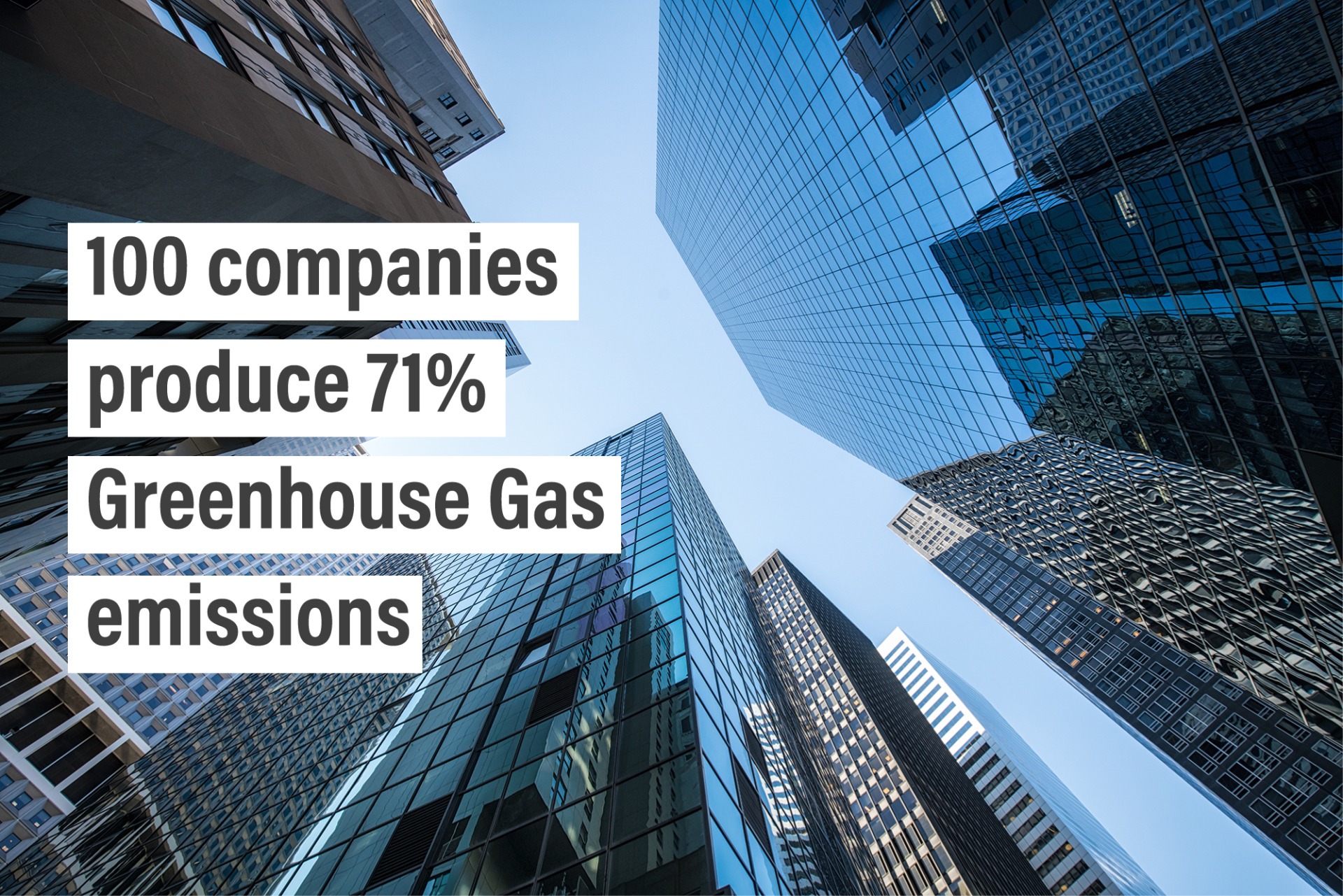We are an award winning product design consultancy, we design connected products and instruments for pioneering technology companies.
The climate responsibility outlook for 2022 and beyond
Reading time 11 mins
Key Points
- The climate crisis and environment instability is worsening but actions taken this decade could limit the severity of future impact
- Governments, fossil fuel industries, and investors need to make climate responsibility a priority
- The narrative on the climate conversation needs to change: simple, meaningful and emotive language that calls people to action instead of debates and conferences
- 100 companies produce 71% of Greenhouse Gas emissions. Only 46 countries (none of which are the biggest polluters) have a carbon tax or emissions trading scheme, none of the non-participating countries or companies are being held accountable
- Empowered citizen volunteers who can exercise personal and political power (e.g. advocacy, civic diplomacy, resilience intelligence programs) to shape effective climate policy are needed

Ben Mazur
Managing Director
The fact that the climate is in crisis and we all need to increase our level of engagement and reduce our environmental footprint is no secret. It is also no surprise that we are unlikely to meet the UN’s Sustainable Development Goals by 2030 nor get to the Paris Agreement’s net-zero emissions target by 2050 without radical change on a global scale [1].. What’s startling, however, is how reticent governments, major industries, and investors are to making necessary changes and the disregard for climate responsibility their inaction implies.
But the good news is that even though we’re failing to make resounding progress towards behavioural and systematic change, the test isn’t over yet! The newest report from the Intergovernmental Panel on Climate Change (IPCC Report), the world’s most authoritative body on climate science, concluded that the planet will probably reach or exceed 1.5℃ of warming within the next two decades. However, limiting warming to this level and preventing the worst climate impact will depend on our actions this decade.
Changing the narrative on the climate conversation
The current language surrounding climate change is complex and confusing. Language influences behaviour – words matter. Because the climate conversation is moving so fast and can get quite technical, it’s easy to get confused by all the jargon, so the message losses all meaning and importance. A study was conducted to determine the public’s understanding of climate change terminology, [2] and researchers found that:
- The majority of participants find terms such as mitigation, tipping-point, and carbon neutral as difficult to understand
- More than half of the participants were unfamiliar with the term mitigation in a climate context and associated it with law or insurance. Another third confused it with mediation
- Terms such as tipping-point brought to mind a seesaw and gave the impression that the issue could go either way or easily back to the way it was before
- Less than half understood what carbon neutral means
- Subjecting people to obscure terms leaves them feeling confused and disengaged
The first step towards climate responsibility is more than just understanding the climate change jargon. It’s also about using language the target audience will connect to and delivering a clear call to action message. Another study conducted by SPARK Neuro set out to measure the kinds of phrases that participants have an emotional reaction to [3]. By placing a range of devices on participants to track, quantify, and measure responses, they found that:
- Words that people responded to emotionally were “climate crisis”, “environmental destruction,” “weather destabilisation,” and “environmental collapse”
- The phrase ‘climate crisis’ got 60% more of an emotional response
- The worst in terms of emotional engagement or attention was “global warming” and “climate change”
The increases in natural disasters and extreme weather conditions worldwide highlight that the climate has already changed. So instead of discussing climate mitigation and change, we should emphasise climate adaptation and crisis. Instead of asking politicians whether they believe in climate change, perhaps we should ask them whether they understand the science…
100 companies produce 71% Greenhouse Gas emissions
According to a report published by the Carbon Disclosure Project (CDP), just 100 companies are responsible for the emissions causing global warming since 1998. While it’s worrying that so few companies (all belonging to oil, coal, gas, and cement industries) can have such a catastrophic global impact, it’s also encouraging to know precisely who to target for impactful results: the public investor-owned companies [4]:
- Investors have a central role to play in the transition to renewable energy
- Investors can make their financial support conditional based on the commitment to the decarbonisation of the energy sector
- Investors who keep their stakes tied to fossil fuels will find it riskier with time as the energy sector is changing so fast
Introducing a carbon tax or fee is another way to incentivise the biggest Greenhouse Gas (GHG) producers to transition to renewable energies faster. Economists argue that it’s also the most efficient and cost-effective way to address the climate problem [5]:
- Higher taxes on carbon-based fuels will encourage households and businesses to look to alternatives such as solar power, which will lead to less pollution and fewer pollution-based diseases and deaths
- Businesses and industries will develop more environmentally friendly production processes
- Encourages investment in renewable energy and will lead to increased technological development
- Raises revenue that countries can use to fund investments needed to reach sustainable development goals
46 countries are pricing emissions through carbon taxes or emissions trading schemes (ETS); pricing is tricky and too cheap [6]. Disappointingly, the countries that produce the most GHG emissions (USA, China, and India) have no system in place, meaning that policymakers and environmental lobby groups need to do more.
Is immediate climate-responsible action possible?
The climate crisis has been brewing for decades, and yet the fossil fuel companies and biggest GHG-emitting countries are not being held accountable. The international community has mechanisms to place sanctions on countries that violate human rights and invade the sovereignty of other nations. Why can’t the same be done on behalf of the planet we are part of and need to survive?
In response to the State of the Global Climate report published by the World Meteorological Organisation in 2021, United Nations Secretary-General António Guterres proposed critical actions to jump-start the transition to renewable energies [7]:
- Greater access to renewable energy technology and supplies
- Tripling of private and public investments in renewables
- An end to subsidies on fossil fuels (+/- $11 million per minute)
That these actions could be met via revenues received from strict carbon taxes, increased pressure placed on the biggest polluting nations to reform, and fossil fuel investors shifting their priorities toward renewables is evident. That there is a lack of urgency at a political level is also clear, which means that civil society needs to take on the onus of climate responsibility.
“Insanity is doing the same thing over and over and expecting different results” – Albert Einstein
As the UN prepares for its 27th Climate Change Conference in Egypt at the end of the year, one can’t help but wonder at the insanity of it all. Delegates from around the world accumulating air miles and increasing their carbon footprint to discuss what they already know sends mixed messages and is unlikely to produce results different to the previous 26 conferences.
On the other hand, empowered citizen volunteers who can exercise personal and political power to shape effective climate policy is an approach that could produce promising results. For example, Citizen’s Climate International is a non-profit organisation with chapters worldwide that galvanises civic engagement in international processes. Their core areas of focus include:
- Volunteer Policy Advocates Program: Provides the structured education, support and training needed to meet with public officials, engage with local and national media, increase grassroots participation, and build climate advocacy skills
- Civic Diplomacy Program: Connects the advocacy program to decision-making spaces where citizens are often underrepresented
- Carbon Pricing Program: Advocates for decarbonisation, creating local benefits, and ensuring development is green and inclusive
- Resilience Intelligence Program: A collaborative climate-smart finance initiative aimed at building multi-system resilience
Slow and steady doesn’t always win the race
The time for debating, summits and conferences is over. We need to put our best running shoes on if we’ve any hope of winning the race. With most governments and international bodies failing to make much of a difference in response to the climate crisis, it’s up to ordinary people to take climate responsibility more seriously and be the change we want to see.
How can you make your home, work environment, and local community more climate responsible?
- Levin, K. (n.d.). 5 Big Findings from the IPCC’s 2021 Climate Report. World Resources Institute. Retrieved 29 September 2022, from https://www.wri.org/insights/ipcc-climate-report
- Bruin, B. W. de. (2021, August 12). Public understanding of climate change terminology. SpringerLink. Retrieved 29 September 2022, from https://link.springer.com/article/10.1007/s10584-021-03183-0?error=cookies_not_supported&code=7583eeae-d4fe-4c68-9096-00c3672b07f7
- Colagrossi, M. (2022, April 19). Use these phrases when talking about climate change. Big Think. Retrieved 29 September 2022, from https://bigthink.com/neuropsych/climate-change-phrases/
- 100 companies are responsible for 71% of GHG emissions. (n.d.). Retrieved 29 September 2022, from https://www.activesustainability.com/climate-change/100-companies-responsible-71-ghg-emissions/?_adin=02021864894
- Addressing climate change through carbon taxes. (2021, September 21). World Economic Forum. Retrieved 29 September 2022, from https://www.weforum.org/agenda/2021/06/addressing-climate-change-through-carbon-taxes/
- More Countries Are Pricing Carbon, but Emissions Are Still Too Cheap. (2022, July 21). IMF. Retrieved 29 September 2022, from https://www.imf.org/en/Blogs/Articles/2022/07/21/blog-more-countries-are-pricing-carbon-but-emissions-are-still-too-cheap
- Four key climate change indicators break records in 2021. (2022, May 18). World Meteorological Organization. Retrieved 29 September 2022, from https://public.wmo.int/en/media/press-release/four-key-climate-change-indicators-break-records-2021
Get the print version
Download a PDF version of our article for easier offline reading and sharing with coworkers.
We love to talk about new ideas
Do you have an idea? Book a consultation with an expert - it's free, it's confidential and there are no obligations.
+44(0)117 329 3420
[email protected]
Ignitec Technology Centre
1 The Powerhouse
Great Park Road
Bradley Stoke
Bristol
BS32 4RU



0 Comments